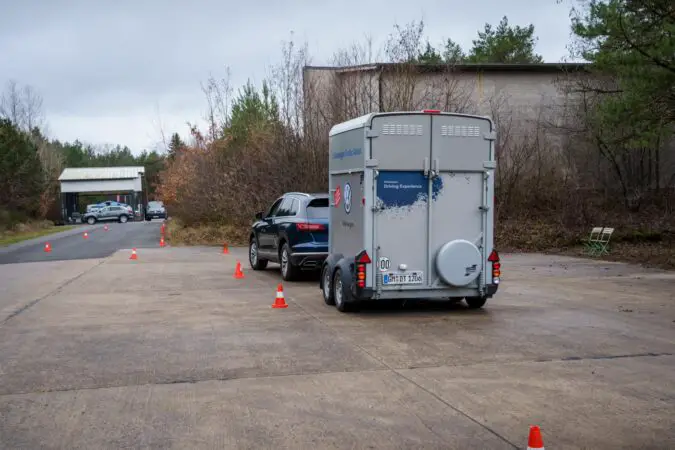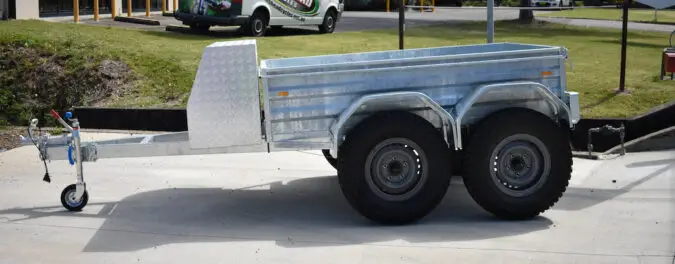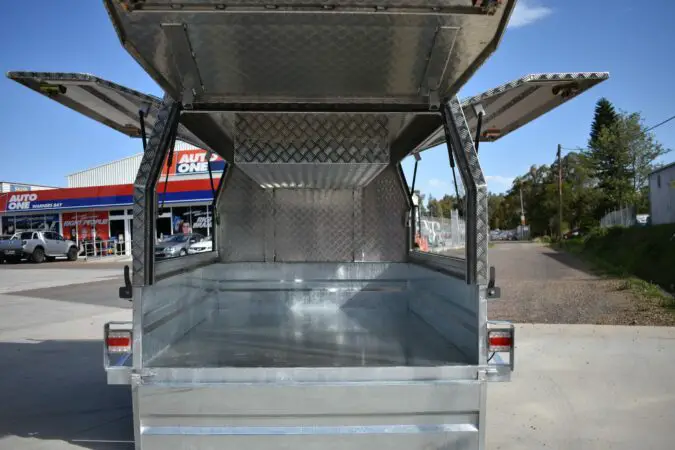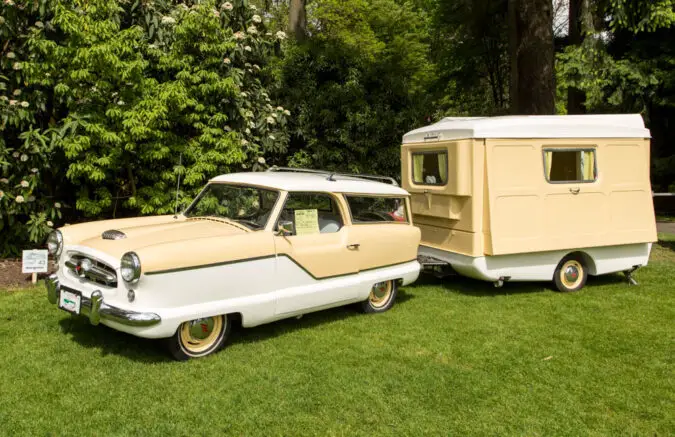When you plan for a weekend camping adventure, do you usually leave your dirt bike behind? Or your jet ski? Triple towing is one way to ensure that you can have fun during your camping adventures. But is it just about hitching the second trailer behind your travel trailer and hitting the road? We are afraid not.
Before you plan on triple towing your toy to your camping destination, there are a plethora of things you need to consider. Is triple towing legally permitted in your state or the state you are visiting? Are there any limitations on the weight of the trailer you can carry? What speed limit should you stick to when you are triple towing?
The answers to these questions are not that straightforward. We wish they were but sadly, they are not. As different states have different rules about triple towing, it is necessary that you should learn them all.
- What Is It?
- Which States Permit It?
- Additional Laws
- Commercial And Personal
- Sources of Information
- Tips And Tricks
Let us dig in a little deeper to see what triple towing is.
What Is Triple Towing?
The short answer to this question is towing two trailers behind a truck. The second trailer usually carries additional cargo that does not fit in the main trailer
As many travel trailers do not provide the facility for recreational purposes or to carry your toys like quad bikes, or snowmobiles, triple towing looks like an effective way to carry them. But it is not that simple.
Triple towing is a maneuver that only an experienced driver can do. The additional length and weight are thrown in by the second trailer, making it harder to accelerate, brake, and turn the vehicle.
When it comes to triple towing, there are also a plethora of rules that you should understand and follow. These range from simple yes or no to it, or more specific restrictions on weight, category, type of cargo, and other characteristics of the second trailer.
No matter what the purpose is, it is essential that you should be familiar with the rules that govern it. To make matters more complicated, each state has its own set of rules for it, as we know. So, when you plan a trip, you will need to consider the rules of the state you start from, the state you end your trip in, and all the states you pass through on the way there.
So, let us dig into the details and find out which states permit triple towing and which of them do not. We will also have a look at the more in-depth rules that you should know before you connect that second trailer.
Which States Permit Triple Towing And Which Do Not?
As we discussed, there are multiple states in the United States that permit triple towing. In fact, more than half of the states wave a green flag for it. This should make it easier for your next adventure. But forget not, if there is one state that does not triple towing on your route, you may need to find alternate arrangements to evade fines.
Let us have a look at the states you should not do triple towing. This list can help you away from those fines you do not need in your getaway days. The states that do not allow triple towing are Alabama, Delaware, Florida, Georgia, Illinois, Kansas, Maine, Maryland, Massachusetts, Michigan, Mississippi, Nevada, New Hampshire, New Jersey, New York, Oklahoma, Oregon, Rhode Island, Texas, Virginia, Washington, West Virginia, and Wisconsin.
The states which allow triple towing include Alaska, Arizona, Arkansas, California, Colorado, Connecticut, Hawaii, Idaho, Indiana, Iowa, Kentucky, Louisiana, Minnesota, Missouri, Montana, Nebraska, New Mexico, North Carolina, North Dakota, Ohio, Pennsylvania, South Carolina, South Dakota, Tennessee, Utah, Vermont, and Wyoming.
So, planning to hitch up your second trailer and hit the road right away? Well, not yet. There are a few more laws you need to be aware of before you hit the road. Even in the states that permit triple towing, there are several laws that limit their usage on the road.
But why do you need additional laws on triple towing? As we know, triple towing can be dangerous if not done properly. Being legal does not mean that triple towing is completely risk-free. That is why states have additional laws to ensure the safety of road users as well as their family.
These regulations may span from top speed, loading capacity, and more. Let us have a look at them in detail in the coming section.
Additional Laws On Triple Towing
If a simple yes or no answered everything, the world would have been an easier place to live. But sadly, that is not the case. So instead of being legal or illegal in different states, triple towing must meet several regulations. These regulations also vary from state to state. If you plan to span the length of the country with two trailers hitched to your truck, you may need to read this.
The regulations on triple towing include…
1. Speed Limits
This is the most obvious of all the restrictions. Speed limits apply to almost every road in the world, not just in the States. But this can vary with the vehicle as well.
Normally cars, SUVs, and pickup trucks have higher maximum speed limits than massive semi-trucks. This is because of the weights they carry, and the additional braking distance required to stop the vehicle.
With this logic, it makes perfect sense to impose special speed limits on vehicles that are triple towing. The additional weight, lack of brakes in the second trailer, and all other obvious factors add up, justifying it.
As a consequence, many states curb the maximum speed that these vehicles can go. It may be lower than what is allowed for the truck towing the trailer if it was running alone.
Hence, do not depend on the road signs to follow the speed limit. This may not give you the actual triple towing speed limit. Before setting out, call up the state’s DMV or Highway Patrol to understand the speed limits well. Searching online on their respective websites will also help. This is particularly important as laws change, and you may not always get the most recent information from other sources.
So, the next time you see a 70-mph speed limit board, do not gun for it while you are triple towing. Be responsible and stick to the laws of the land. Else, a heavy ticket is going to spoil the mood of your fun trip.
2. Limitations On Length
The longer a trailer chain is, the harder it is going to be to control it. Especially, if there is an inexperienced person on the wheel, it can be hard to steer. Hence, most states prescribe and enforce a limit on the total length of the trailers you can carry behind your truck.
In some of the states that permit triple towing, the total length of all 3 units, the truck, main trailer, and second trailer, must not exceed 65 feet. So, if you have a colossal fifth wheel, you may be out of options here.
But fret not, this law gets relaxed in some other states. They permit a total length up to 70 feet or even 75 feet. The laws constantly change so before you set out, make sure your triple towing setup is well within the regulations.
3. Type Of Main Trailer
If you plan to tow your bike trailer behind a conventional travel trailer, some states may not allow that. In these states, triple towing is only allowed if you are adding the second trailer to a fifth wheel.
The fifth-wheel trailers connect to a specialized hitch mounted in the center of the truck bed, instead of a bumper-level hitch. This adds more maneuverability while on the move. This gives the fifth wheel an added advantage over conventional travel trailers, hence the special consideration in the law.
4. Type Of Cargo On Second Trailer
If your triple towing plan involves towing a bunch of building materials to a different state, listen closely. You may be doing an illegal move. In many states where triple towing is legal, there are restrictions on what you can carry on the second trailer.
These states, like Minnesota, limit the cargo on the second trailer to recreational equipment. So, your fun toys like your dirt bike (unless you’re willing to learn how to make a dirt bike street legal and how to ride a dirt bike), all-terrain vehicles, snowmobile, etc. are all good to go.
But industrial equipment, building materials, or other work-related cargo on the second trailer is a big no-no. Carrying this may need a proper commercial setup and it can possibly demand a permit, depending on the state you drive in and the cargo you plan to carry.
Look up the local, en route, and destination laws to have a clear idea of what you can carry. Best option? Leave behind your non-recreational cargo or find alternate arrangements for the same.
5. Special Endorsement On Driver’s License
This is yet another hurdle you need to pass if you want to triple tow. Some states like California and Michigan require you to have a special endorsement on your license if you plan to tow any trailer over 10,000 pounds. You should also get the same endorsement to tug along a motorhome that is over forty feet in length.
Towing a large trailer requires a lot of experience as the increased length and weight can be hard to manage. Especially for inexperienced drivers at the wheel, it can be intimidating. This can be especially pronounced if you have a long conventional travel trailer. The bumper-level hitch can pose problems to the inexperienced.
A fifth wheel may be a lot easier to handle. But this does not take away the fact that for a rookie driver, it can be a handful. On that account, states ask for special endorsements on your license.
You can get this endorsement by taking a test and paying a small fee to renew the license. The new license will come with an ‘R’ on it, certifying you to drive on the road while triple towing.
This law restricts triple towing to persons skilled enough to do so. The weight and length restrictions are also easy to break while you are triple towing. Hence, before you head out with two trailers, make sure your papers are all clear.
With all these laws gripping on triple towing, it is absolutely essential that you should learn all the latest changes before engaging in triple towing. Contact the DMV, or Highway Patrol or refer to their official websites for the most recent genuine data. This can save you a lot of trouble down the road.
Difference Between Commercial And Personal Triple Towing
So, you are on your way to your camping destination. The moment you enter a different state, the triple towing laws of which are unknown to you, you end up in doubt. Suddenly you see a large semi-truck hauling 2 large trailers. Well, that is triple towing. So, you should be good to go. Or are you? The short answer is, not really.
Semi-trucks are complex machinery. With their colossal body and the massive weight associated with it, these trucks need some huge brake bite to stop them. To achieve this high braking force, these trucks come with powerful air brakes.
When a truck is towing large trailer or trailers, the air brake lines extend to their wheels as well. This ensures that when the driver hits the brakes, the brake force travels to them. As a result, in the event of braking, all wheels, including the ones on the trailer, will brake with equal pressure, at the same time.
In contrast to this, triple towing on a personal truck may not have this luxury. The towing vehicle will have its own brakes, obviously. The main trailer may have its electric brakes to aid in braking. But the second trailer carrying your dirt bike, jet ski, all-terrain vehicles, etc. may not have any brakes at all.
This means that when the driver brakes, all brakes do not work at the same time, and not with the same pressure. This can increase the stopping distance and can potentially lead to an accident. Hence, the laws on triple towing exist in different states.
So, the next time you cross into a state, do not bank your hopes on the sight of a semi triple towing. To ensure a smooth traveling experience, read the laws of each state carefully beforehand.
Sources Of Information
With a lot of laws on triple towing around us, it can be confusing to follow them. The fact that all of the changes from state to state makes it worse. So how do you track them? Where do you find the right and latest information on the subject?
Let us help you with that. Your search for the latest laws on triple towing can start and end at the following websites. There are websites included in this list that offer you more information, beyond triple towing laws.
Ready Brake
What is the easiest way to convey overly complex information? Pictographic charts of course. Readybrake.com utilizes this design to provide a clear view of the triple towing laws in each state, along with the additional restrictions in each of them.
Good Sam’s Rules Of The Road
This can be your go-to website when you require laws on triple towing. The quite wordy yet information-filled page of this website gives you more than just each state’s take on triple towing. Beyond the yes or no questions, Good Sam offers a lot more insight into the specific laws within each state. This makes it easy for you to map your road trip better.
Moreover, this website provides information not just about the states of the United States of America but Canada as well. So, they can help you out if your road trips transcend national boundaries, for readers from both countries.
Trailerlife Trailer Towing Guides
Beyond the laws, there are a few things you should know about triple towing. Factory tow ratings for your main vehicle is one of them. This website gives you this information, and more, for a plethora of models.
They keep a lot of information about vehicles dating all the way back to 1991. Their Guide to Towing PDF is very comprehensive with a colossal amount of info in them. It includes details on almost all vehicles on sale in that particular year. It also adds more details on towing, including hitch types, tips and tricks, and a lot more. Definitely, a link that deserves a bookmark.
RV Safety And Education Foundation
This is yet another website that provides you with information on weight ratings for each truck model. The information provided includes Gross Vehicle Weight (GVW), Maximum Trailer Weight, and Gross Combined Weight ratings for these trucks.
This can help you determine the capability of your truck, and check if you are breaking any triple towing weight restrictions. Helps you evade some fines.
Local DMV And Highway Patrol Websites
The most reliable and fresh information comes from the local DMV or the Highway Patrol website. This can ensure that you are completely up to date with the laws of the road and will not end up in trouble. Adds a lot of peace of mind to your trip.
Triple Towing Tips
Now, if you have understood all these laws and you have finalized your route, some more information can help you go a long way while triple towing.
So, here are some useful tips on triple towing for you.
1. Calculate The Weights
This is especially important as most states that allow triple towing have restrictions on weight. They demand that the weight of the second trailer you tow must not exceed the unladen vehicle weight of your fifth wheel or the unladen weight of your truck.
The unladen weight of your fifth wheel is what it weighs before we load it with cargo.
2. Main Trailer Compatibility
In most states, you cannot pull a bumper pull the second trailer behind a bumper pulled the main trailer. You must have a fifth-wheel trailer as your main trailer for triple towing to be legal.
Moreover, you must also make sure that the fifth wheel is also compatible with the purpose. It should have the required facility to tow a second trailer. When you are purchasing a new fifth wheel, make sure that it comes with either a gooseneck hitch or a ball hitch.
This will avoid any surprises when you are trying to connect your second trailer.
3. Frequently Maintain Main Trailer And Truck
The added weight of the second trailer puts more load on the truck as well as the fifth wheel. This wear and tear will eat into the life of this machinery if you do not maintain them frequently.
There are a few ways for you to keep your car or truck in top nick while towing. All the routine maintenance checks and replacements must be done earlier as the wear is higher. Especially if you triple tow regularly.
Triple Towing Facts:
- Triple towing refers to towing two vehicles behind the vehicle you’re driving.
- Triple towing is legal in some states but not everywhere, and it’s important to determine which states and their specific regulations.
- At the time of the publishing of the article, the following states allowed triple towing: Alaska, Arizona, Arkansas, California, Colorado, Connecticut, Hawaii, Idaho, Indiana, Iowa, Kentucky, Louisiana, Minnesota, Missouri, Michigan, Montana, Nebraska, Nevada, New Mexico, North Carolina, North Dakota, Ohio, Pennsylvania, South Carolina, South Dakota, Tennessee, Utah, and Vermont.
- Maximum allowable length varies from state to state, ranging from 60’ to 65’ for triple towing setups.
- Commercial drivers hauling two or more trailers have training specific to the practice of “hauling doubles”, and most states require a special license endorsement for commercial drivers.
- Safe triple towing requires that the combined weight and towing capacity be within safe limits, with excellent condition and maintenance of all vehicles involved.
- There are additional safety regulations that vary from state to state, including special license endorsements, weight, height, width, and length limits.
- Considerable RV driving and towing experience is recommended before attempting triple towing.
- Insurance coverage should be checked and brakes and tires should be in optimal condition prior to triple towing.
- Additional risks and precautions should be considered, including increased stopping distances and weather conditions.
Summary: Is Triple Towing For You?
If you are a driver with respectable experience piloting long trailers you can consider triple towing. But before you set out on the journey, as we discussed, it is imperative that you should follow all rules.
Irrespective of the years of experience you racked up, towing long trailers, in some states, you must have a special endorsement on your driver’s license. Even then, you may have to stick to the length, weight, speed limit, cargo, and other restrictions that control triple towing.
Even if all these are met, there is no need to mention that triple towing in the states that do not permit it is illegal. Hence, no matter how careful you are, you will have to find an alternate arrangement for the second trailer.
Triple towing is a great method to ensure that you do not miss out on anything during your trip. If you stick to the legal limits and take care to avoid a conversation with the police on the motorway, you should be fine.
So, what are you waiting for? Plot your next road trip, hitch up that second trailer, load your ATV on it and set off.






